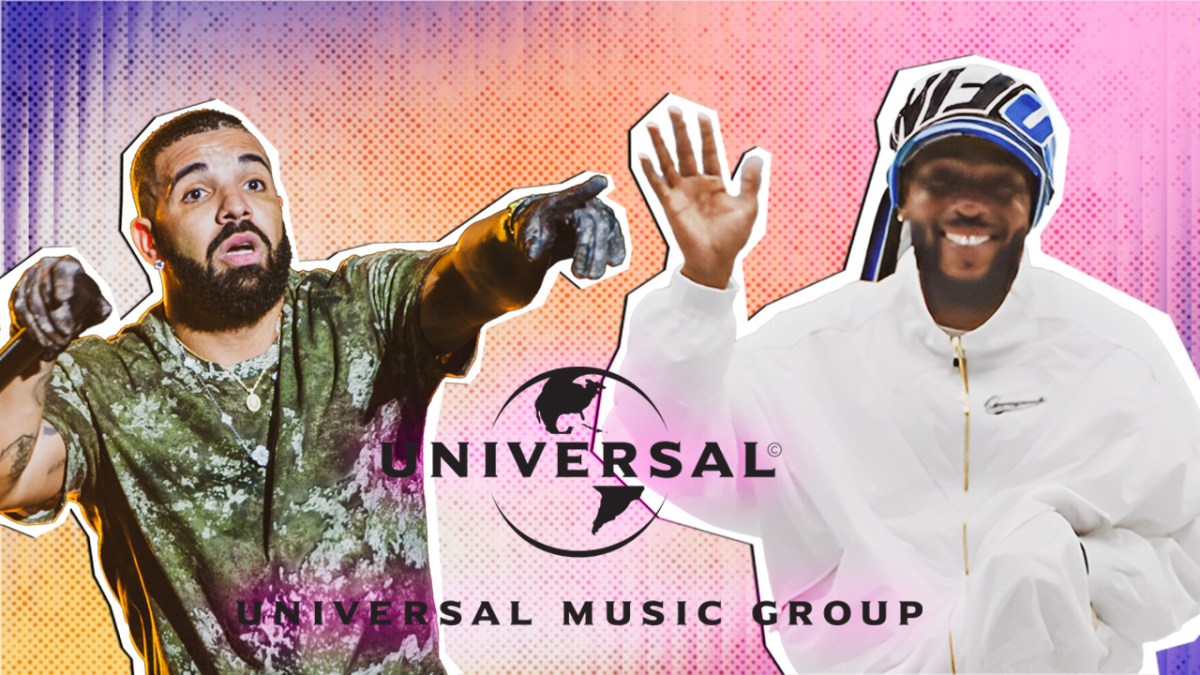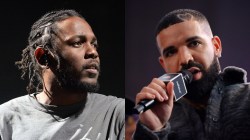Rap beef has involved physical violence, apologies at the behest of mothers and even, sadly, murder, but never before has it entered the courtroom — until now.
Kendrick Lamar‘s era-defining diss track “Not Like Us” went scorched earth on Drake, accusing him of inappropriate conduct with underage girls and being a Hip Hop interloper who has sustained his career by “colonizing” regional scenes.
Not only that, but “Not Like Us” shot to number one on the Billboard Hot 100, broke several streaming and sales records, and became an inescapable global smash that ruled the summer.
Six months on, after an ill-fated riposte in “The Heart Part 6,” a broad attempt to regain public favor with his curious 100 GIGS drops and a defiant Kick stream with internet star xQc, Drake is taking the fight to court.
AD LOADING...
This week, the Canadian superstar submitted two “pre-action” filings against Universal Music Group (UMG), seeking discovery and depositions for potential future lawsuits. These aren’t lawsuits themselves, but petitions asking for more information before a lawsuit is filed. Even if he gains access to the information he desires, Drake is not legally bound to follow through with a lawsuit.
In the first filing, Drizzy claims that UMG — the parent company of both his label Republic and Kendrick’s longtime home of Interscope — used bots and payola to boost the popularity of “Not Like Us” on streaming services and radio, ensuring it would become a mega-hit.
It seeks “pre-action discovery” from UMG and Spotify to allow Drake to “identify appropriate defendants” and pursue a lawsuit alleging violations of the Racketeer Influenced and Corrupt Organizations (RICO) Act, as well as New York’s Deceptive Business Act and False Advertising Act. Regarding a potential civil RICO, it points to “predicate acts of wire fraud, mail fraud, and/or bribery.”
The second, which also names iHeartMedia as a respondent, accuses UMG of defamation and claims the music giant could have halted the release of “Not Like Us” which “falsely accus[ed]” him of being a pedophile. It also to seeks to determine “whether, and how, UMG funneled payments to iHeartRadio and its radio stations” to promote “Not Like Us.”
Drake claims that he already has “sufficient” evidence to pursue a claim for defamation against UMG and may tack on claims of civil fraud and racketeering based on what other information comes to light from the depositions.
Universal Music Group have vehemently denied the claims, saying in a statement: “The suggestion that UMG would do anything to undermine any of its artists is offensive and untrue. We employ the highest ethical practices in our marketing and promotional campaigns. No amount of contrived and absurd legal arguments in this pre-action submission can mask the fact that fans choose the music they want to hear.”
It’s also important to note that while Drake is accusing UMG of wrongdoing, he has not yet made any filing against Kendrick (who has yet to comment). The petitions are also focused on “Not Like Us” and do not mention any of Kendrick’s other diss songs, most notably “Meet the Grahams” which also accused Drake of being a pedophile and fathering a secret daughter.
There’s been much speculation about Drake’s intentions with these filings. Some believe he’s trying to undermine “Not Like Us” and potentially have it removed from streaming services or gain some kind of apology from UMG and/or Kendrick. It could also be a ploy to prevent Kendrick from performing “Not Like Us” during his Super Bowl halftime show in February, which will be seen by a global audience of hundreds of millions.
AD LOADING...
It is also possible that Drake’s issues lie not with Kendrick but his longtime label of UMG, with whom he signed a giant $400 million contract in 2022, one of the biggest deals in music history.
The reactions to the filings have not helped the 6 God’s current public standing thanks to rampant social media jokes about him taking legal action in a rap battle. They have also inadvertently generated further interest in Kendrick, his new album GNX and “Not Like Us,” which has seen an increase in streams and chart positions since the petitions were made public.
Below, HipHopDX highlights the most noteworthy claims from the two filings and breaks down Drake’s case against UMG.
UMG paid for bots to boost streams of “Not Like Us”
Drake’s primary claim in his first petition, which was filed in New York, is that UMG, “directly or through Interscope,” employed the use of “bots” to artificially boost the streams and YouTube views of “Not Like Us” and make it appear more popular than it actually was.
The filing cites as evidence a person who appeared on Akademiks‘ livestream and claimed that he was paid by an individual connected to Interscope to fabricate 30 million Spotify streams for “Not Like Us.” In return, the “whistleblower” said he received $2,500 via Zelle and was promised a percentage of the song’s profits.
However, Akademiks later claimed that a source at Spotify told him the streaming numbers for “Not Like Us” had not been inflated, although this is not mentioned in the filing.
Akademiks says Spotify denied his 'Not Like Us' botting rumors 👀
"I talked to my man from Spotify. […] Them Kendrick streams is real." pic.twitter.com/R4RzvdGap3
— Kurrco (@Kurrco) July 8, 2024
UMG gave Spotify a 30 percent discount to license “Not Like Us”
Drake alleges that Spotify and UMG agreed to a deal where the label would charge the streaming service 30 percent less than usual to license “Not Like Us.” In exchange, Spotify would recommend “Not Like Us” to users “who are searching for other unrelated songs and artists.”
What the legal filing does not mention is Spotify’s Discovery Mode, the streaming platform’s program that boosts a song’s reach to its users. In exchange, Spotify take a 30 percent royalty commission, reducing the amount the label and artist make off a song.
It is possible that UMG and/or Interscope opted “Not Like Us” into Spotify’s Discovery Mode, which would be entirely legal.
AD LOADING...
UMG paid Apple Music to divert users to “Not Like Us” instead of Drake’s music
UMG are also accused of paying Apple to have their digital assistant Siri “purposely misdirect” users to “Not Like Us.” The filing cites a video made by HipHopDX‘s own Jeremy Hecht where he demonstrates that when asking Siri to play Certified Lover Boy, it would play “Not Like Us” instead of Drake’s 2021 album.
What the filing does not mention, however, is that Siri played “Not Like Us” because the song features a reference to Certified Lover Boy and the technology relies on lyric recognition.
Drake used my video in his (pre action) lawsuit against UMG 😂
I made a video showing that Siri was taking you to “Not Like Us” when you asked to play “certified lover boy” on Spotify. I later showed this was because of lyric recognition. But they didn’t include that part lol pic.twitter.com/tEZQCrVM0s
— Jeremy Hecht (@Jeremy_Hecht) November 26, 2024
UMG engaged in payola to boost radio play of “Not Like Us”
UMG are also accused of good old-fashioned payola — the illegal act of paying a commercial radio station to play a song without the station disclosing the payment — to increase airplay of “Not Like Us.” While the filing does not state which stations were involved in this alleged scheme, it does accuse UMG of using third party intermediaries to funnel money to radio employees.
UMG paid social media influencers to promote “Not Like Us”
Drake’s filing further accuses UMG of paying social media influencers to promote “Not Like Us” on their platforms. The filing claims that UMG paid NFR Podcast, which has hundreds of thousands of followers on YouTube and X (formerly Twitter), to promote and endorse “Not Like Us,” which he claims is a form of payola. The filing does not disclose the amount the label allegedly paid NFR or if there were any other large social media accounts involved.
It also claims that in an unprecedented move, UMG removed the song’s copyright restrictions on YouTube and Twitch, further “incentiviz[ing]” influencers to spread “Not Like Us.”
UMG fired employees associated with Drake in an attempt to conceal their schemes
One of the wildest claims in the filing is that UMG fired employees that were considered loyal to Drake in order to cover up its conspiracy to turn “Not Like Us” into a smash hit. It does not say how many employees were allegedly let go by UMG and it is not known if the employees themselves are seeking action against the company.
UMG blames Kendrick Lamar and even threatened to sue Kendrick if Drake were to file a lawsuit against UMG
Drake claims that he has attempted to mend his relationship with his longtime label but that UMG have “refused to engage in negotiations.” Instead, the filing says that UMG has “insisted that Drake should initiate legal action against [Kendrick] rather than UMG, and even threatened to bring its own legal claims against [Kendrick]” — presumably for allegedly faking streams and engaging in payola — “if Drake were to pursue claims against UMG.”
Drake has “suffered economic harm” as a result of UMG’s actions
The filing also alleges that Drake’s pockets have taken a hit because of the success of “Not Like Us,” although it doesn’t get into specifics. The petition describes streaming as a “zero-sum game” where the popularity of one artist directly effects that of another.
AD LOADING...
UMG’s plot was partly motivated by Interscope executives wanting to boost their own profits
The filing lays out the alleged motivation behind the scheme, claiming that Interscope executives were looking to maximize their own profits as part of an annual incentive program. It specifically accuses Interscope CEO John Janick of being incentivized to inflate the success of “Not Like Us” in order to secure a bonus payout from UMG.
UMG defamed Drake by knowingly releasing a song which accused him of being a pedophile
The second petition, filed in Texas, centers around allegations that UMG defamed Drake by releasing “Not Like Us.” While Drizzy is not actually suing Kendrick Lamar — the person who made the allegedly defamatory remarks — he is accusing UMG of facilitating the claims of him “being a sex offender, engaging in pedophilic acts, harboring sex offenders, and committing other criminalsexual acts.”
Drake claims that UMG were aware of the content of the track and had the power to halt the release of the song or edit its lyrics. He further alleges that UMG amplified “Not Like Us” to cause damage to his reputation, with the aim of increasing revenues for the company.
Drake, of course, made numerous allegations about Kendrick in his own diss songs, including domestic violence, being molested as a child and not being the biological father of one of his children.
An anonymous lawyer said to Rolling Stone about the case: “Defamation is really, really hard to prove. Especially when you engage in a similar battle yourself. I think if this wasn’t in the context of a rap battle and Drake wasn’t [dissing] himself, he’d have a lot better claim.”
AD LOADING...
UMG potentially funneled money to iHeartRadio to play “Not Like Us”
Finally, Drake speculates that UMG may have secretly paid media giant iHeartMedia to play “Not Like Us” on their many radio stations across the country.
“[Drake] has been unable to confirm whether any iHeartRadio stations were among the stations paid as part of UMG’s pay-to-play scheme or whether there were any direct payments from UMG to iHeartRadio to promote ‘Not Like Us,'” the filing reads.
“Given iHeartMedia’s status as the ‘number one audio company’ in the country, [he] believes that UMG engaged in similar tactics to drive radio play of ‘Not Like Us’ on iHeartMedia stations.”
UMG have not yet responded to Drake’s second filing or the claims of defamation within. iHeartMedia and Spotify have also yet to comment.






